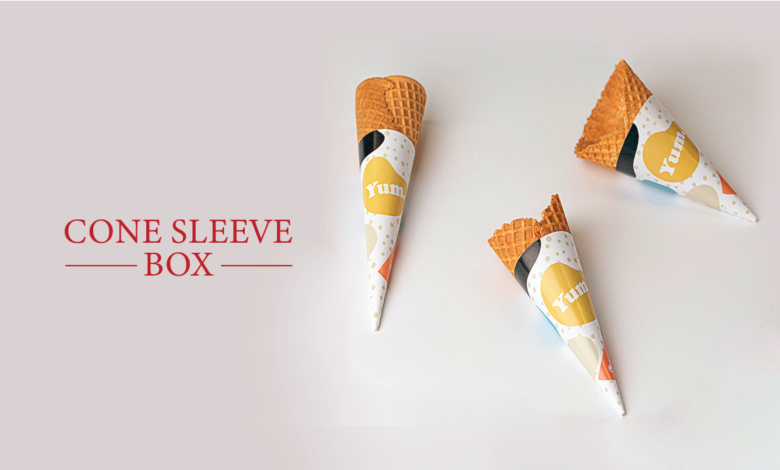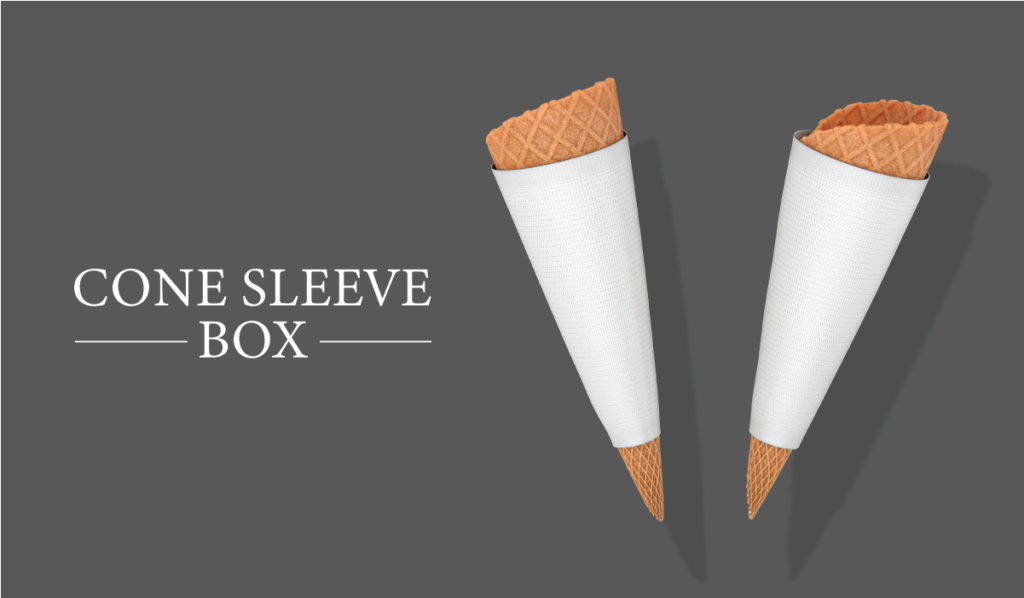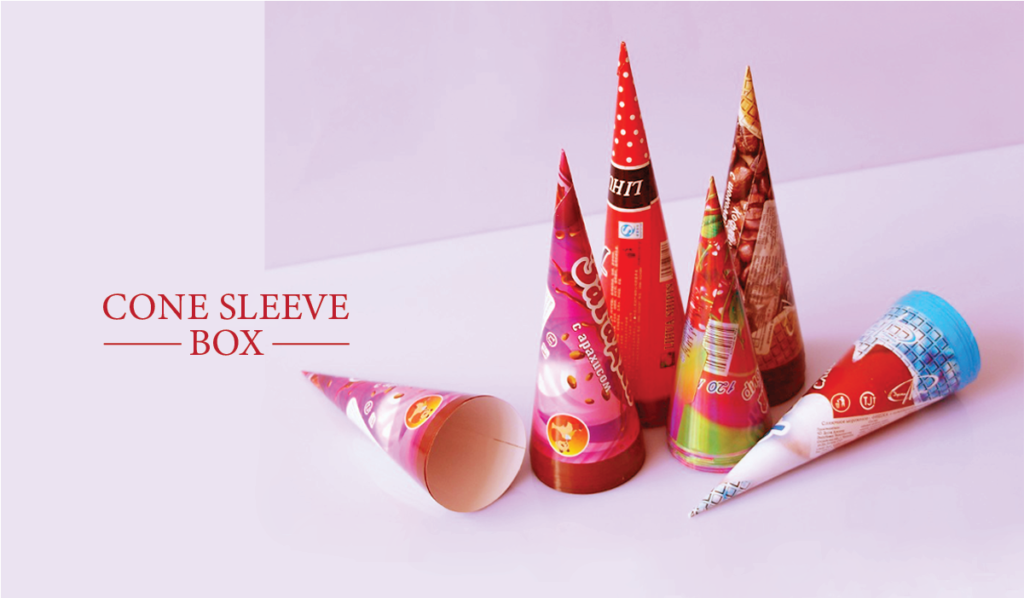Eco-Friendly Materials for Custom Cone Sleeves

In today’s eco-conscious world, businesses are increasingly recognizing the importance of adopting sustainable practices, particularly in packaging. Custom cone sleeves, often used for ice cream, desserts, and other treats, offer a prime opportunity to embrace eco-friendly materials and minimize environmental impact. This comprehensive guide explores the benefits, types, printing techniques, design considerations, challenges, and solutions for using eco-friendly materials for custom cone sleeves.
Introduction
Commanding Attention: The Importance of Eco-Friendly Materials
Custom cone sleeves play a crucial role in branding and product presentation. However, the environmental consequences of conventional packaging materials cannot be ignored. By prioritizing eco-friendly materials, businesses demonstrate their commitment to sustainability and environmental stewardship.
Piquing Interest: Growing Environmental Awareness
With climate change and environmental degradation making headlines, consumers are increasingly demanding eco-friendly products. Custom cone sleeves made from sustainable materials appeal to environmentally conscious consumers and contribute to positive brand perception.
Creating Desire: Meeting Consumer Demand for Sustainable Packaging
Businesses that invest in eco-friendly packaging demonstrate their responsiveness to consumer preferences. Sustainable packaging aligns with evolving consumer values, fostering loyalty and trust among environmentally conscious customers.
Benefits of Eco-Friendly Materials
Reduced Environmental Impact
Eco-friendly materials, such as biodegradable and recycled options, minimize using finite resources, and reduce pollution. Businesses can mitigate their environmental footprint and contribute to a healthier planet by choosing sustainable materials for custom cone sleeves.
Positive Brand Image
Embracing eco-friendly practices enhances brand reputation and credibility. Consumers are more likely to support brands that demonstrate a commitment to sustainability, leading to increased customer loyalty and brand advocacy.
Regulatory Compliance
As governments worldwide implement stricter regulations on packaging waste and environmental sustainability, businesses must ensure compliance with these standards. Utilizing eco-friendly materials for custom cone sleeves helps companies meet regulatory requirements and avoid potential fines or penalties.
Cost Savings
Contrary to common misconceptions, eco-friendly materials can offer cost-saving benefits in the long run. While initial investment costs may be higher, reduced resource consumption, waste management expenses, and potential tax incentives contribute to overall cost savings over time.
Enhanced Consumer Perception
Consumers perceive brands that prioritize sustainability as socially responsible and ethical. By using eco-friendly materials for custom cone sleeves, businesses can differentiate themselves from competitors and attract environmentally conscious consumers.
Types of Eco-Friendly Materials

Biodegradable Materials
Definition and Characteristics
Biodegradable materials can decompose naturally, with microorganisms breaking them down into simpler, non-toxic substances. These materials typically originate from renewable resources and do not contribute to long-term environmental pollution.
Examples: PLA, PBAT, PHA
Polylactic Acid (PLA), Polybutylene Adipate Terephthalate (PBAT), and Polyhydroxyalkanoates (PHA) are commonly used biodegradable materials in packaging. PLA, derived from corn starch or sugarcane, offers excellent clarity and heat resistance. PBAT combines biodegradability with flexibility, making it suitable for various packaging applications. PHA, produced by bacterial fermentation of sugar or lipids, boasts high biodegradability and versatility.
Applications and Limitations
Biodegradable materials are suitable for various packaging applications, including custom cone sleeves. However, their biodegradability depends on specific environmental conditions, such as temperature, moisture, and microbial activity. Additionally, biodegradable materials may have higher production costs compared to conventional plastics.
Recycled Materials
Types: Post-consumer, Post-industrial
Recycled materials can be categorized as post-consumer or post-industrial, depending on their source. Post-consumer materials are recovered from products that have reached the end of their useful life, such as used packaging or household items. Post-industrial materials are generated during manufacturing and recycled back into production.
Recycling Process Overview
Recycling involves collecting, sorting, cleaning, and processing recyclable materials to create new products. Custom cone sleeves made from recycled materials help close the loop on resource consumption and reduce the demand for virgin materials.
Advantages and Challenges
Recycled materials offer numerous advantages, including resource conservation, energy savings, and waste reduction. However, challenges such as contamination, limited availability of high-quality recyclables, and market demand fluctuations pose barriers to widespread adoption.
Sustainable Sourcing
Forest Stewardship Council (FSC) Certification
The Forest Stewardship Council (FSC) certification ensures that wood-based materials, such as paper and cardboard, are sourced from responsibly managed forests. Choosing FSC-certified materials for custom cone sleeves supports sustainable forest management practices and biodiversity conservation.
Renewable Resources
Materials derived from renewable resources, such as bamboo, sugarcane bagasse, and hemp, offer sustainable alternatives to traditional packaging materials. These renewable resources regenerate quickly, minimizing environmental impact and reducing reliance on fossil fuels.
Fair Trade Practices
Businesses committed to ethical sourcing practices can opt for materials certified by Fair Trade organizations. Fair Trade certification ensures that producers receive fair wages and work under safe and humane conditions, promoting social equity and environmental sustainability.
Eco-Friendly Printing Techniques
Water-Based Inks
Water-based inks use water as a solvent instead of volatile organic compounds (VOCs) found in traditional solvent-based inks. These inks offer vibrant colors, excellent print quality, and faster drying times while minimizing environmental impact and health risks.
Soy-Based Inks
Soy-based inks are derived from soybean oil, a renewable and biodegradable resource. These inks emit fewer volatile organic compounds (VOCs) and no petroleum-based solvents, making them an environmentally friendly custom cone sleeve printing option.
UV Printing
UV printing utilizes ultraviolet (UV) light to cure inks instantly, resulting in faster production speeds and reduced energy consumption. UV inks contain fewer solvents and emit lower levels of volatile organic compounds (VOCs), making them eco-friendly for packaging applications.
Digital Printing
Digital printing eliminates the need for printing plates, reducing setup times, material waste, and energy consumption. This on-demand printing process offers flexibility, customization, and superior print quality while minimizing environmental impact.
Design Considerations for Eco-Friendly Cone Sleeves

Minimalistic Designs
Simplicity is critical when designing eco-friendly cone sleeves. Minimalistic designs reduce ink usage and material waste and convey a modern and sophisticated aesthetic.
Use of Natural Colors and Patterns
Incorporating natural colors and patterns, such as earth tones, foliage, and organic textures, enhances the eco-friendly appeal of cone sleeves. These design elements evoke a sense of environmental consciousness and harmonize with sustainable branding efforts.
Incorporating Recyclable Elements
Integrating recyclable elements like paperboard or cardboard into cone sleeve designs facilitates post-consumer recycling and promotes circular economy principles. Designing sleeves with easily separable components further enhances recyclability and reduces environmental impact.
Functional and Aesthetic Balance
Balancing functionality with aesthetics is essential when designing eco-friendly cone sleeves. Sleeves should protect the product and enhance its visual appeal and consumer experience, contributing to brand loyalty and repeat purchases.
Challenges and Solutions
Cost Considerations
While eco-friendly materials and printing techniques may involve higher upfront costs, businesses can offset expenses through long-term savings, regulatory compliance incentives, and enhanced brand reputation. Additionally, investing in sustainability demonstrates corporate responsibility and fosters consumer trust, leading to increased market share and profitability.
Supply Chain Logistics
Implementing eco-friendly packaging solutions requires collaboration across the supply chain, from material sourcing to production and distribution. Businesses must establish partnerships with suppliers, manufacturers, and logistics providers committed to sustainability and environmental stewardship. Streamlining supply chain processes, optimizing transportation routes, and embracing digital technologies can minimize environmental impact and enhance operational efficiency.
Consumer Education and Awareness
Educating consumers about the benefits of eco-friendly packaging is crucial for driving adoption and behavioral change. Businesses can effectively communicate their sustainability initiatives through marketing campaigns, product labeling, and online resources. Engaging with consumers through social media, brand ambassadors, and community events fosters dialogue, builds trust, and cultivates brand loyalty.
Regulatory Compliance
Navigating complex regulatory requirements is a challenge for businesses transitioning to eco-friendly packaging. Compliance with environmental regulations, product labeling standards, and packaging waste management directives requires ongoing monitoring and adaptation. Partnering with regulatory experts, industry associations, and sustainability consultants can help businesses stay informed and compliant while driving continuous improvement in environmental performance.
Long-Term Benefits
Despite initial challenges, investing in eco-friendly packaging yields numerous long-term benefits for businesses and the environment. Reduced environmental impact, enhanced brand reputation, regulatory compliance, and cost savings contribute to sustainable growth and competitive advantage. By prioritizing sustainability, businesses can future-proof their operations, mitigate risks, and create value for stakeholders.
Conclusion
Custom cone sleeves play a significant role in branding, product presentation, and consumer experience. By embracing eco-friendly materials, printing techniques, and design principles, businesses can minimize environmental impact, enhance brand reputation, and meet consumer demand for sustainable packaging solutions. As the shift towards sustainability accelerates, companies prioritizing eco-friendly practices will emerge as leaders in their industries, driving positive change and creating a more sustainable future for future generations.
FAQs
Why should businesses prioritize eco-friendly materials for custom cone sleeves?
Businesses should prioritize eco-friendly materials for custom cone sleeves to minimize environmental impact, enhance brand reputation, and meet consumer demand for sustainable packaging solutions.
What are some examples of biodegradable materials suitable for cone sleeve production?
Examples of biodegradable materials suitable for cone sleeve production include Polylactic Acid (PLA), Polybutylene Adipate Terephthalate (PBAT), and Polyhydroxyalkanoates (PHA).
How can businesses ensure the sustainability of their sourcing practices?
Businesses can ensure the sustainability of their sourcing practices by obtaining certifications such as Forest Stewardship Council (FSC) certification, sourcing materials from renewable resources, and adhering to fair trade practices.
What printing techniques are environmentally friendly for custom cone sleeves?
Environmentally friendly printing techniques for custom cone sleeves include water-based inks, soy-based inks, UV printing, and digital printing.
What are the critical design considerations for eco-friendly cone sleeve packaging?
Key design considerations for eco-friendly cone sleeve packaging include:
- Minimalistic designs.
- Use of natural colors and patterns.
- Incorporation of recyclable elements.
- Balancing functionality with aesthetics.




